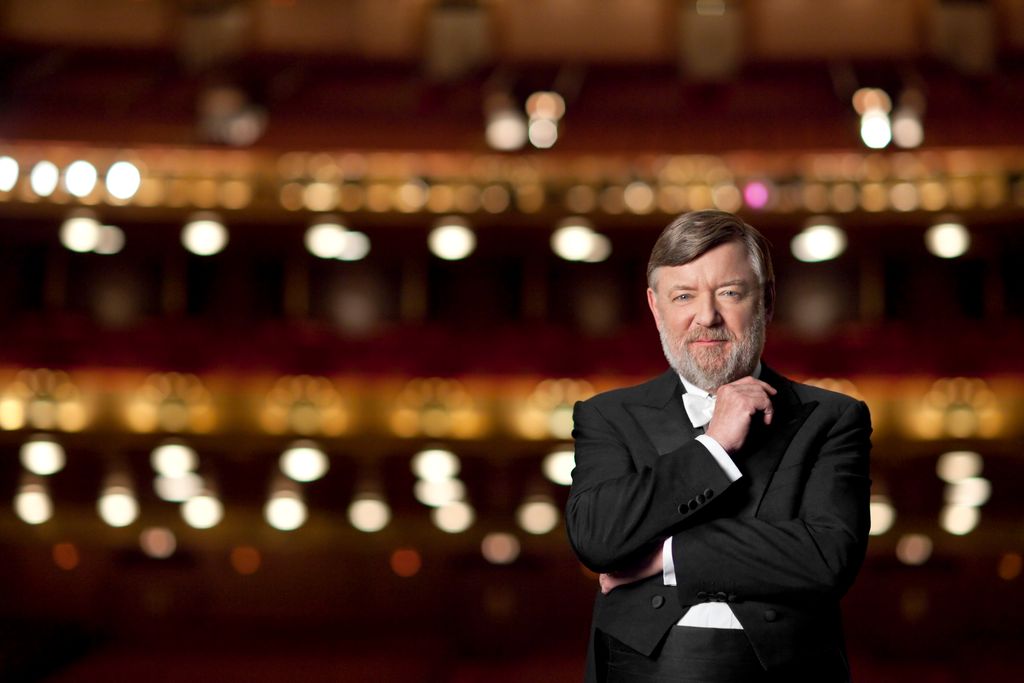To say “I grew up with Sir Andrew Davis” isn’t quite accurate.
Davis was a regular a sight growing up in southern Ontario in the 1970s and 80s. As Music Director of the Toronto Symphony Orchestra from 1975 to 1988, Davis led a varied and fascinating series of programmes, helping to cultivate new ideas on sound and its live iteration. He felt as familiar as the green carpet in the little house where I grew up – as familiar as the fruit trees in the front yard and the glass Pop Shoppe bottles in the refrigerator. It was normal to climb into a rumbling old station wagon with my music-loving mother twice a month (sometimes more) and see Davis stand on the podium in front of the Toronto Symphony Orchestra in the then-new Roy Thomson Hall. He didn’t make classical cool – I didn’t care about any of that; to me it existed outside of such labels – but he did help to make that world less daunting.
No one smiled at the creaky Royal Conservatory building where I took my yearly piano exams. No one smiled at the opera, either; very few smiled at recitals or chamber concerts. Davis was different. Vaguely resembling a large teddy bear, Davis had a discernible warmth that you could feel, whether seated near or (for us more often the case) far. I felt that warmth, especially when we sat in the hall’s choir loft behind or to the side of the stage and observing Davis made me want to listen more to everything with more care and attention, to make mental notes of things I heard and saw, to think about relationships between pieces within one programme. Davis also made me want to learn more about conductors and their mysterious art: a flick of the wrist, a raise of the shoulders, a big swoosh of the arms; what did it all mean? I began, slowly, to try and understand.
Trips to the hall were not limited to ones with my mother; those arranged through school, though far less frequent, were nonetheless welcome variations to the drudgery of boring gym and daily bullying. They were happy journeys to a second home – green carpet replaced by grey carpet; fruit trees by labyrinthine halls and escalators. They were also opportunities to finally become an authority, however briefly. I would lead my fellow students to the loos and show them the drinking fountains, and tell them to shut up when Davis (and Gunther Herbig after him) inhaled and raised baton.
“Just listen… ”
And then I would listen too, open-mouthed and pie-eyed. It was one thing to hear this music on the radio and records; it was quite another to hear it live. I started to hear counterpoint, instrumentation, texture, colour. Davis, perhaps more than any other musician at that time, made classical music real for me – me, an art-loving nerdy, oddball girl from a small suburban town who began to desperately want to pursue a musician’s life, who eventually skipped classes in grades 6-7-8 to sit at home and play the piano, who would pause from Beethoven-Handel-Liszt-Kabalevsky and ponder the memory of Davis’s arms as they moved through a space that hardly seemed empty. “How would he play this passage?” I wondered. “What would he tell me?”
News of Davis’s passing today at the age of 80 was met with immense outpourings of grief – from singers (including Sarah Connelly, Christine Goerke, Alice Coote), conductors (Sakari Oramo, Dalia Stasevska, John Andrews) and a number of classical organizations, including those with whom he’d held longtime positions including Glyndebourne (Music Director, 1989-2000), Lyric Opera Chicago (Music Director and Principal Conductor, 2000-2021) the Royal Liverpool Philharmonic (Conductor Emeritus), and BBC Symphony Orchestra (1989-2000; Conductor Laureate). Norman Lebrecht praised Davis’s wide repertoire, noting that “Beethoven, Berg, Brahms, Britten, Elgar and everyone else were treated with respect and meticulous attention.” He led 700 performances of over 60 operas by 22 different composers, including Wagner’s epic Ring Cycle. One of my favorites is his recording of Harrison Birtwistle’s The Mask of Orpheus with the BBC Philharmonic Orchestra and BBC Singers, released via NMC in 2021; I’m not sure I would have considered the work of Birtwistle were it not for Davis.
In early 2020 Davis commented in a video for the Chicago Symphony Orchestra (a preview of a concert he was leading) on the connections between Beethoven and 20th century composer Michael Tippett. “In their different periods, they were both kind of looking to show us the same thing: a way forward that would enrich us.” Beethoven’s Third Symphony may well have been the very first thing I experienced Davis leading live; the sound was riveting to my young ears – thrilling, poetic, profoundly moving. Today I re-listened to the acclaimed 1991 Teldec recording of Ralph Vaughan Williams’ Symphony No.6, (a longtime favorite) with Davis leading the BBC Symphony Orchestra – and I experienced precisely the same feelings as a child, along with that now-deeply-planted desire to simply, quietly… listen. Davis was so much a part of my musical life and it seems strange and sad to now have to contemplate life without his presence. I am so grateful for having grown up, in my own way, with Sir Andrew Davis. Thank you, maestro.
Top photo: Dario Acosta
Update:
My feature with New Zealand Opera’s Brad Cohen, announced last Thursday, will be publishing this week. Sincere apologies for the delay.

1 Pingback